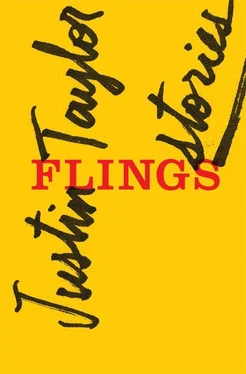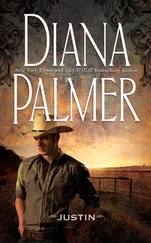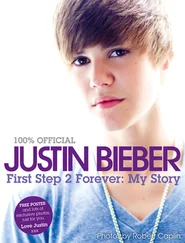The conference was in Denver that year. She sat for hours at her table, not selling any books at all. There were many seminars taking place in conference rooms, also panels and readings and lectures, all of which she skipped. In the evening she insinuated herself with some friendly strangers who claimed unanimous fealty to “avant-post-meta-narrative,” though it was possible she’d gotten the prefix sequence wrong. They hailed from around the Southeast and ran some kind of website together. She followed them from one hotel bar cocktail hour to another, then retired to her own hotel for an On-Demand movie followed by a hot bath that lasted as long again.
The second day she put all the books she’d brought — a hundred of them, in a wheeled blue suitcase — out on the table in a careful pyramid. She made a sign that said PLEASE TAKE ONLY ONE. Beside these she put out the stack of flyers for the contest, and then she got up to walk around the fair, sneaking sidelong glances at university journals and small presses of every niche and distinction (or lack thereof). She was barely curious as to the natures of these outfits and sought mostly to protect herself from being shanghaied into chitchat, the inevitable segue to the sales pitch. This lack of interest, she recognized, was equally present in her would-be readership no less than in herself, and in this knowledge one could locate the precise central flaw of the entire enterprise. A cult of self-expression was throttling the life from the world.
Well, why not? All her favorite music of youth — which she still loved and believed in and blared constantly, both at home and in her office — heralded and celebrated apocalypse, devastation, chaos. She was nobody’s savior and had no wish to be. Let the world save itself, if it could. She personally aspired to be part of the problem — to exacerbate the mess.
Abigail saw Cal sitting second from the end in a row of five men crammed cheek by jowl at a single table. CYGNUS LOOP COLLECTIVE, their banner read. Cal’s face was grooved now and his hairline had hiked back a ways but sure as anything it was him. He was signing a book for somebody and did not see her. All around them young people rushed: boys with goatees and girls with bangs, everyone clutching official maps and shouldering tote bags misshapen with bulk. Maybe she was wrong about the conference-goers, the future of literature, and who knew what else. Or was it possible to be both wrong and right at once? Cal’s customer walked away and he became focused on twirling his pen. Her shadow spilled over the white tablecloth and his books; he looked up.
They found a small sunny patch of grass outside the convention center and leaned with their backs against a giant decorative hunk of Colorado stone.
He’d worked construction at some point; his mother had died. He had left New York, returned, then left again. He was involved with the Unitarian church in his new hometown, which was conveniently just over on the other side of Boulder, though he’d been there four years, so was it really “new” anymore? (He actually asked her this — she shrugged.) He worked in sales for a regional brewery, did his books thing on the side. The year after they graduated, he said, he’d written the best poem of his life — the only good one he’d ever written, if the truth was to be told about it, and why shouldn’t he tell the truth? He was content with his life now. He had long since figured out who he was. He looked at her meaningfully as he said this, as if his strange parenthetical glance could somehow hyperlink back through the years to both acknowledge and disown his behavior on that strange night that had ended their intimacy. So anyway he’d written the good poem and sent it to Poetry magazine — where it was accepted! — a victory that had nearly ruined him. There was a long struggle he mostly glossed over, the upshot of which was that he wrote prose now, considered himself a novelist. “But enough about me,” he said.
She kept most of it to herself. He could always Google her. Perhaps he already had. She deflected their conversation back toward his life (it wasn’t difficult) and in service of this aim feigned an interest in his “project,” as he had called it with no hint of irony, no trace of shame.
“A sonnet in novels,” he said.
“You mean a novel in verse?”
“No,” he replied with a flash of the old maddening confidence. “Fuck John Wheelwright. I meant what I said.”
It was to be a cycle of fourteen books, and their several titles taken together would form a sonnet — the very sonnet he’d had in Poetry , in fact. He expected to write one book every two years for twenty-eight years and complete the cycle in time for his sixty-fifth birthday. He’d finished and self-published Book One earlier this year and had brought it to Denver for its official debut. Cal, short for Calvert, was his middle name. “Cal” was the only thing anyone had ever called him, but as a published author he was F. Calvert Donovan. She felt sure she had known about the F. but couldn’t remember whether she had ever known what it stood for. She did not ask about it now. Book One in his cycle was called I Molt Backwards Through Time , and though she couldn’t help but notice that this phrase was four syllables too short for a sonnet line — to say nothing of the missing iambs — she chose not to spoil the moment and held her tongue.
Abigail could see that whatever had broken loose in Cal that hellish evening all those years ago had never been righted or healed. She felt special, in retrospect, to have witnessed the birth of such a deep and unyielding derangement. She said she would look his sonnet up. He said there was no need because it was printed as the frontispiece to the novel — and would be printed in each subsequent book as well, with the given titular line in boldface. She said she’d come by his table later, maybe tomorrow, and they could trade books.
A book of hers! Why hadn’t she said anything sooner? But of course because what else would she be doing here? And a trade! It was too perfect! He’d be honored. What was it called?
“ Beloved Predator ,” she said.
“It’s so damn good to see you,” he said, and reached over and gave her a hug. He was firmer now, more muscled in early middle age than he had ever been young. The construction work? The good mountain air? She was stiff in his arms at first but then leaned forward, pressed her chest against his and even got one arm around his shoulders — squeezed and counted three Mississippi before pulling back. He was slow in releasing her, then smoothed his shirt and said he had to get back to his table. He didn’t know the Cygnus Loop guys too well — he’d met them through a listserv — and he didn’t want to impose on their goodwill, but maybe they could meet up later that evening at his “off-site” reading. This seemed to mean that the event was not a part of the official conference program and therefore not held on the convention center’s grounds. He’d secured the back room of a restaurant that unfortunately was vegan, but the burritos were supposed to be decent, he said, and anyway the drinks were cheap. He produced a small spiral notebook like a reporter might carry, flipped it open to a blank page, scribbled down the restaurant’s name and address and his own phone number, then ripped the page out and folded it in half. On the outside of the fold he wrote in spindly block capital letters the title of his novel, then underlined it: I MOLT BACKWARDS THROUGH TIME . “So you don’t forget what it’s for,” he said. “I know how hectic the conference gets.” He pressed the folded paper into her palm with both hands. They stood; he hugged her again, then turned and jogged, nearly sprinted, back inside. She lingered in the grass, watching the long glass faces of the downtown buildings flash fire-gold in the sinking western sun.
Читать дальше












